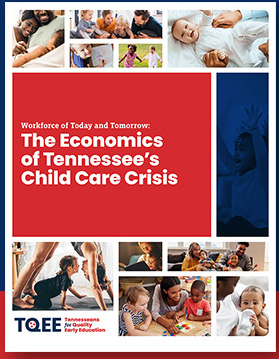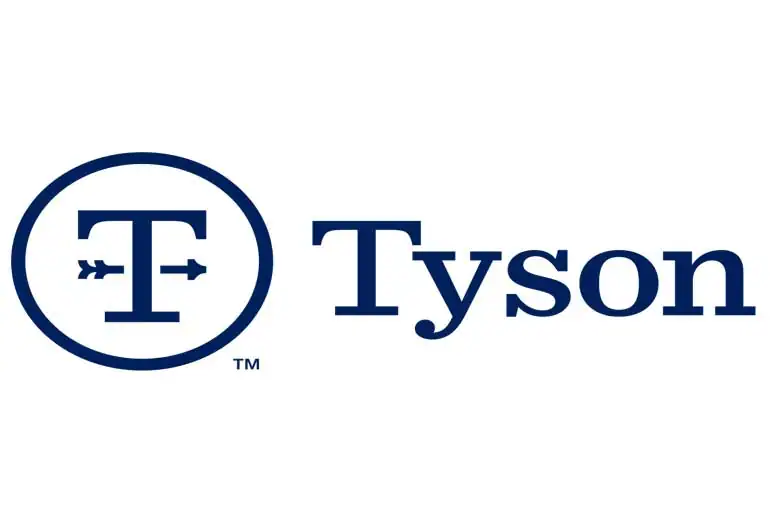New report details adverse economic impact on parents, businesses and taxpayers
Prior to the pandemic, child care was a growing crisis for families and our economy. Fast forward to today, Tennessee’s working parents of young children continue to struggle to find and afford child care. For Tennessee employers the situation is likewise acute, with the child care crisis exacerbating the state’s workforce shortage.
The topline findings of a new study that examined adverse economic impacts of inadequate child care on Tennessee parents, businesses and taxpayers reveal $2.6 billion annually in lost earnings and revenue.
The study, conducted by Tennesseans for Quality Early Education (TQEE) with support from Zogby Analytics and economist Clive Belfield, analyzed survey results from 1,297 working parents with children under age 6 to determine how child care challenges adversely affect workforce participation and productivity, and quantifies the resulting economic impact.
“There’s no denying that we are facing a child care crisis here in Tennessee and across the country, and this report shines a light on just how dire the situation is for working families, businesses and our economy,” said Blair Taylor, president and CEO of TQEE. “Our current child care system needs an overhaul. It’s our intent for this report to serve as a call to action for collaborative problem-solving by state government and the private sector.”
Tennessee parents who encounter child care problems are hit hardest – losing an estimated $1.65 billion in earnings each year. An overwhelming 80 percent of Tennessee working parents of children under age 6 reported employment disruptions due to inadequate child care. Specifically, 26 percent quit or were fired; 32 percent turned down a job offer or promotion, 30 percent reduced hours from full-time to part-time or were prevented from increasing hours to full-time; and 20 percent were forced to stop seeking employment altogether.
Employers in turn experienced losses of $497 million from lower productivity, reduced revenue, increased hiring and retention costs and, ultimately, lost profits. While the economic impact on families and employers resulted in lower consumption of taxable goods, lower profit margins, and ultimately reduced tax revenues of approximately $413 million per year.
“Tennessee’s parents are the backbone of our state’s workforce and of our state’s economic success story. This important research shows that many of our parents continue to be more challenged than ever by barriers to child care,” said Pat Sheehy, president of the Tennessee Business Roundtable. “In order to enter and stay in our labor force, and to perform and succeed fully at work for the benefit of themselves, their families, their employers, and our economy, many Tennessee parents must first have access to an affordable care program to which they can entrust the safety, health and well-being of their children – the very future of our state.”
“If we want the next chapters of Tennessee’s economic story to be successful, TQEE’s work indicates that growing the size and quality of both our current and future workforces is going to require stakeholders to work together to increase the supply of safe, affordable child care services, delivered at quality levels which fully support the educational, social and emotional needs of Tennessee’s children,” said Sheehy.
Access, affordability and quality are the primary factors that drag down the system. More than two out of every three parents said they have trouble accessing care at all. Affording child care is also a major issue for many Tennessee families, with 50 percent of parents citing affordability as a challenge. The affordability problem becomes even clearer in light of the fact that one-third of Tennessee children under 6 live in families with incomes less than $40,000, yet the average annual cost of center-based child care is $11,068 and $10,184 for infants and toddlers respectively. That’s more than the in-state college tuition at most Tennessee universities. Another 58 percent cite finding suitable quality as an issue.
“The brain develops more in the first five years of life than during any other time, and about two-thirds of Tennessee children may spend a substantial portion of that consequential period of development in some form of child care,” said Taylor. “Beyond the immediate economic implications, it’s imperative we prioritize access to high-quality and affordable child care options in order to provide our children with the strongest foundation for future learning.”
In addition to the statewide report, TQEE produced six companion regional reports that feature data specific to Davidson County, Shelby County, Knox County, Hamilton County, Northeast Tennessee and West Tennessee. All of the reports can be viewed in full at tqee.org/2022-child-care-study/.
Report partners reflect a statewide concern among Tennessee business organizations to address the inadequate child care system. They are Baker Donelson, Ballad Health, Baptist Memorial Healthcare Corporation, Benwood Foundation, Blue Cross Blue Shield of Tennessee, Bristol Chamber of Commerce, Chattanooga Area Chamber of Commerce, First Horizon Bank, Greater Jackson Chamber, Greater Memphis Chamber of Commerce, Hyde Family Foundation, Joe C. Davis Foundation, Johnson City Chamber of Commerce, Kingsport Chamber of Commerce, Knoxville Chamber of Commerce, McNairy County EDC and Chamber of Commerce, Memphis Tomorrow, Nashville Area Chamber of Commerce, PNC Bank, Scarlett Family Foundation, Tennessee Business Roundtable, Tennessee Chamber of Commerce, The Healing Trust and The Urban Child Institute.





